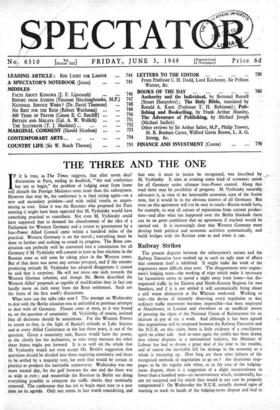THE THREE AND THE ONE
IF it is true, as The Times suggests, that after seven days' discussions at Paris, ending in deadlock, " the real conference has yet to begin," the problem of lodging away from home will disturb the Foreign Ministers even more than the railwaymen. However that may be, the conference is at least trying again—on a new and secondary problem—and with initial results as unpro- mising as ever. Since it was the Russians who proposed the Paris meeting it might have been expected that M. Vyshinsky would have something practical to contribute. Not even M. Vyshinsky could have supposed that to demand the abandonment of the idea of a Parliament for Western Germany and a return to government by a four-Power Allied Council came within a hundred miles of the practical. Western Germany is on the march ; everything must be done to further and nothing to retard its progress. The Bonn con- stitution can perfectly well be converted into a constitution for all Germany if M. Vyshinsky will consent to have as free elections in the Russian zone as will soon be taking place in the Western zones. But of that there was never any serious prospect, and if the uncom- promising attitude M. Vyshinsky has adopted disappoints it cannot be said that it surprises. He will not move one inch towards the Western German solution, and though Mr. Bevin described the Western Allies' proposals as capable of modification they in fact can hardly move an inch away from the Bonn settlement. Such are the fruits of the first week's discussions.
What turn can the talks take now ? The attempt on Wednesday to deal with the Berlin situation was as unfruitful as previous attempts to deal with all Germany. Fissure came at once, as it was bound to, on the question of unanimity. M. Vyshinsky, of course, insisted that all decisions should be unanimous. For the Western Powers to assent to that, in the light of Russia's attitude at Lake Success and at every Allied Conference in the last three years, is out of the question. Given a unanimity rule, Russia would have the power, as she clearly has the inclination, to veto every measure the other three States might put forward. It is as well on the whole that M. Vyshinsky would not even accept Mr. Bevin's suggestion that questions should be divided into those requiring unanimity and those to be settled by a majority vote, for even that would be certain in practice to produce the inevitable controversy. Wednesday was one more wasted day, for the gulf between the one and the three was as wide as ever ; and meanwhile the Russians in Berlin are doing everything possible to reimpose the traffic checks they nominally removed. The conference that has yet to begin must turn to a new item on its agenda. Only one seems in fact worth considering, and
that one, it must in justice be recognised, was inscribed by M. Vyshinsky. It aims at creating some kind of economic union for all Germany under ultimate four-Power control. Along this road there may be possibility of progress. M. Vyshinsky naturally advocates it, in view of the lamentable economic state of the Soviet zone, but it would be in the obvious interest of all Germany. But even on this agreement will rot be easy to reach—Russia would have, for example, to stop all seizure of reparations from current produc- tion—and after what has happened over the Berlin blockade there can be no great confidence that an agreement if reached would be carried out. It is increasingly clear that Western Germany must ,develop both political and economic activities systematically, and build bridges with the Russian zone as and when it can.


































